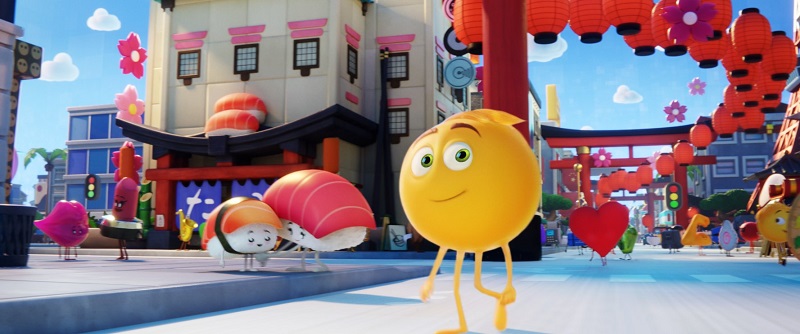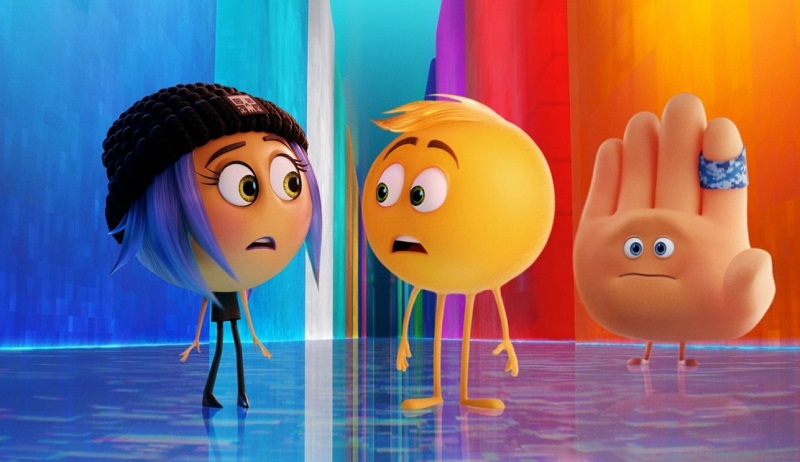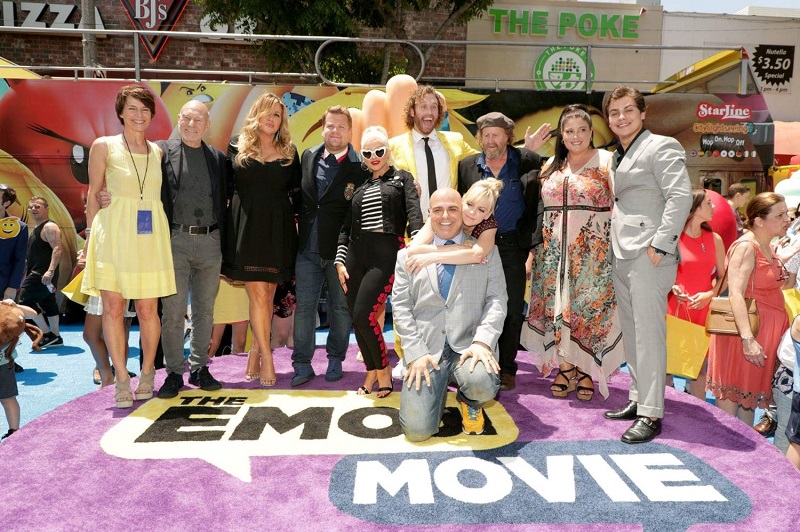When you think about it, The Emoji Movie is a film that could not have happened even three years ago. But, we do live in a world of emojis now and there is no turning back. As a society, we long ago moved past using symbols to communicate, a la hieroglyphics. But in this era of expressing ourselves in 140 characters or less, the symbol has become hot again and that is none more prevalent than the arrival of an entire large screen effort devoted to those cell phone-living artistic representation of feelings, moods and situations.
The Emoji Movie director (and co-writer) Tony Leondis phoned The Movie Mensch for an exclusive chat about the world of emojis and how this entire production came together. Leondis also dishes about why he chose the “Meh” emoji as his main character, voiced by comic extraordinaire TJ Miller. The helmer also talks about his stellar cast that came together for this supremely modern and totally trending picture, including Patrick Stewart, Mya Rudolph (whose role as Smiler we imagine as a QVC host, which sends the director into fits of giggles as he promises to steal that idea for the sequel!), James Corden, Anna Faris, Sofia Vergara and many more.
The Movie Mensch: When you’re making an animated movie, it’d be easy to skew to the littlest audience members. What did you see as your mission with The Emoji Movie?
Tony Leondis: I think the best animated movies; they speak to adults and kids. Walt Disney always said, “With every laugh there’s a tear.” That was kind of my philosophy, and Michelle Kouyate’s — the producer. We wanna make a movie with some meat to it, and Emoji seemed like the perfect movie to do that with.
The Movie Mensch: Your voice cast is just stellar. They say “Do what you love and success will follow.” But, you had to have a couple of “pinch me” moments in the studio when you were working with this cast.
Tony Leondis: Oh my gosh. It really is insane, isn’t it? I feel so lucky and everyone basically really responded to the material beautifully and really got what we were trying to do. Yeah, I feel so lucky. It’s led by T.J. Miller, who is known for being so outrageous, but really can play such emotions so beautifully. I think he breaks your heart in the movie. I think he’s just so tender. [We also have] Anna Faris and James Corden. Anna is the sweet one, usually, and we really wanted to cast her as Jailbreak because we needed someone tough and sweet. James Corden is a wild card and he’s such a great writer. He improvs so much, and brought so much to the table. Maya Rudolph as Smiler, that performance kills me. When we were working on it we came up with she’s the head cheerleader talking to her squad and she wants to win the competition. So that was the kind of the take on that — the happy cheerleader who really wants to win. And Stephen Wright and Patrick Stewart! I mean it’s crazy. It’s crazy.
The Movie Mensch: You know I kept picturing Smiler, and maybe you can do a spin off here, as the QVC host. No matter what they throw at her, she just is gonna smile.
Tony Leondis: OK, I’m gonna steal that. That is hilarious [laughs]. Who knows if we ever get to play in this world again, but that is hilarious. She’s a QVC host. That’s incredible!
The Movie Mensch: I know animation can be strict because you do have to match what’s on the page to what people have drawn, but sometimes you record vocals and then render out the art. Was there room for improv on this, and if so, who was the most game, if that is even title you can adorn on somebody?
Tony Leondis: That’s a good question. Well TJ, first of all, is amazing at improv, if you’ve ever seen his YouTube stuff. So TJ brought so much of his own stuff to the movie, and really helped find and shape the character, and came in and found ways to pluck the dialogue and make it funnier. James Corden did the same thing. He really found ways to spin the lines and just make them very funny in surprising ways. Maya Rudolph — a lot of her stuff is improv. A lot of “I love pushing buttons.” A lot of that kind of silly mundane stuff out of Smiler’s voice is just really funny.
The Movie Mensch: Emojis are striking because, in a way, it’s us as a human species going backwards with hieroglyphics and using images to convey emotions and words. You could talk a little bit about that, but at the heart of this question is “What do you think it is about emojis that they have so caught fire with all of us?”
Tony Leondis: That’s such a good question because people really love emojis. I think with emojis, the human heart has found a way to connect within a world of technology. Because we are on our phones, on our computers, on our tablets, on television, we’re bombarded by all these images. But at the heart of it, when you get an emoji from your mom or from your loved one or from a friend, it touches your heart. And I think at the end that’s what it’s about. It’s about the human connection.
The Movie Mensch: It’s so true. I will never forget when I got my first emoji from my 75-year-old mother. I knew that these things were taking off.
Tony Leondis: Right?! Me too! When my mother’s sending emojis, you know there’s something to them. They’re not just a little fad. It’s a way to communicate, much like hieroglyphics. It’s a way to communicate visually and visually it means something more than just verbally when you get an emoji with a heart face. It’s better than just saying “I love you.” It means something… somehow it connects.
The Movie Mensch: Your protagonist is the “meh,” and he can’t find his “meh.” Why was it “meh” that became the focus of The Emoji Movie?
Tony Leondis: I think in today’s world, it’s easy to be “meh.” It’s easy to be sarcastic. It’s easy to have apathy. I think it’s harder to be brave and convey emotion and express yourself. We wrote the part with TJ in mind, to be every expression — and he just can’t hold it in. He’s just a bundle of emotion. And so the opposite of that, what would push him in the most … how is that getting into emoji trouble? Put him in a family of “meh” where he is the black sheep of that family. So it works story-wise. It’s easy to be apathetic and sarcastic. It’s harder to be genuine, authentic and expressive.




